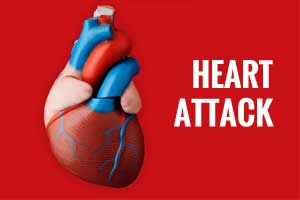- Home
- Editorial
- News
- Practice Guidelines
- Anesthesiology Guidelines
- Cancer Guidelines
- Cardiac Sciences Guidelines
- Critical Care Guidelines
- Dentistry Guidelines
- Dermatology Guidelines
- Diabetes and Endo Guidelines
- Diagnostics Guidelines
- ENT Guidelines
- Featured Practice Guidelines
- Gastroenterology Guidelines
- Geriatrics Guidelines
- Medicine Guidelines
- Nephrology Guidelines
- Neurosciences Guidelines
- Obs and Gynae Guidelines
- Ophthalmology Guidelines
- Orthopaedics Guidelines
- Paediatrics Guidelines
- Psychiatry Guidelines
- Pulmonology Guidelines
- Radiology Guidelines
- Surgery Guidelines
- Urology Guidelines
Early management of Heart Attack: Trial Selatogrel- novel P2Y12 receptor antagonist shows promising results

United Kingdom: Professor Rob Storey, the Cardiovascular Research Unit team at the University of Sheffield and Sheffield Teaching Hospitals NHS Foundation Trust have led the first international study of selatogrel in patients with heart artery disease.
Oral drugs currently in use can take hours to work, particularly in patients who require pain relief such as morphine for their heart attack; but the study found selatogrel, a novel P2Y12 receptor antagonist may provide a solution to this.
Results from the selatogrel study, which were presented at the European Society of Cardiology meeting in Paris in September 2019 and have now been published in the European Heart Journal, the world’s leading heart journal, show that a single subcutaneous injection of selatogrel has a very rapid anticlotting effect within 15 minutes of administration, lasting for up to eight hours. This is ideal for providing an anticlotting effect during the early stages of a heart attack.
Additionally, anticlotting medication is also critical in preventing blood clots from blocking off a stent when a heart attack patient requires further treatment. A stent is a tiny mesh tube that is inserted into affected, or clogged, arteries and expands to keep them open, reducing the chance of further heart attacks by allowing the blood to flow more freely around the heart.
Hence, as current oral anticlotting drugs can take hours to work, the study shows selatogrel would also be particularly ideal for those patients who require emergency heart artery stenting.
Professor of Cardiology at the University of Sheffield and Academic Director and Honorary Consultant Cardiologist at Sheffield Teaching Hospitals NHS Foundation Trust, Rob Storey, was the Chief Investigator for the study which was carried out in 18 centres around the world and included 345 patients.
In this double-blind, randomized study of 345 patients with CCS on background oral antiplatelet therapy, subcutaneous selatogrel was compared with placebo. Platelet aggregation was assessed over 24 h (VerifyNow assay) and 8 h (light transmittance aggregometry; LTA). Pharmacodynamic responders were defined as patients having P2Y12 reaction units (PRU) <100 at 30 min post-dose and lasting ≥3 h.
The authors found that
- At 30 min post-dose, 89% of patients were responders to selatogrel 8 mg, 90% to selatogrel 16 mg, and 16% to placebo.
- PRU values (mean ± standard deviation) were 10 ± 25 (8 mg), 4 ± 10 (16 mg), and 163 ± 73 (placebo) at 15 min and remained <100 up to 8 h for both doses, returning to pre-dose or near pre-dose levels by 24 h post-dose.
- LTA data showed similarly rapid and potent inhibition of platelet aggregation. Selatogrel plasma concentrations peaked ∼30 min post-dose.
- Selatogrel was safe and well-tolerated with transient dyspnoea occurring overall in 7% (16/229) of patients (95% confidence interval: 4–11%).
The researchers post the study concluded that Selatogrel was rapidly absorbed following subcutaneous administration in CCS patients, providing prompt, potent, and consistent platelet P2Y12 inhibition sustained for ≥8 h and reversible within 24 h.
The chief investigator further added, “In Sheffield, we have led the way in the development of more effective anticlotting medications for heart attack, which has markedly reduced the risk of stent blockage and further heart attack. However, we have also discovered that the onset of anticlotting effect of oral drugs can be delayed by more than six hours in heart attack patients, particularly when they have required painkillers such as morphine.
"We have been searching for a solution to this problem and now have characterised the properties of a new drug, selatogrel. These properties seem ideal for the heart attack setting in order to ensure prompt and reliable anticlotting effect. We can now move ahead with larger studies of selatogrel and see if it provides even more effective and safe treatment of heart attacks.”
European Heart Journal
For more details click on the link: https://doi.org/10.1093/eurheartj/ehz807

Disclaimer: This site is primarily intended for healthcare professionals. Any content/information on this website does not replace the advice of medical and/or health professionals and should not be construed as medical/diagnostic advice/endorsement or prescription. Use of this site is subject to our terms of use, privacy policy, advertisement policy. © 2020 Minerva Medical Treatment Pvt Ltd